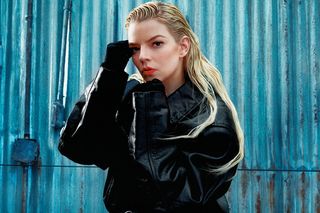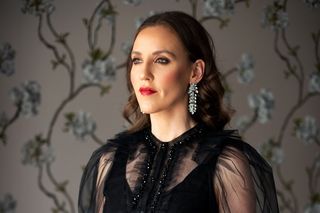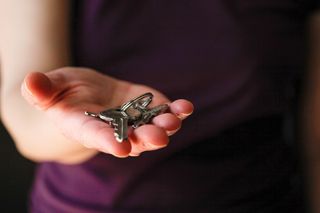From costume designer in Dublin to jazz singer in Paris - meet singer-songwriter Liv Monaghan
For singer-songwriter Liv Monaghan, a move to Paris, made out of impulse and creative necessity, was the start of an unexpected new career, writes Emily Hourican
Liv Monaghan. Photo: Fergal Philips
'I accidentally became a singer," says Cork-born singer-songwriter Liv Monaghan, 31. If that is indeed true, although it's hard to imagine such dedication being the result of an accident, the first step came when she decided to move to Paris in 2012, without a job, a network, or even much French.
"I've always done things out of not being able to do anything else," she says. "I think if you're an artist or a creative person, you just have this terrible niggling thing that sometimes doesn't allow you to stay still… you get really unhappy. People said 'oh it's so brave,' but I think it was more out of necessity. Without wanting to sound dramatic - and I feel melodramatic saying it - but it's that kind of… your soul is kind of weeping a little bit."
Liv, at the time, was working in costume for the National Theatre. "I studied theatre and art history in Trinity, and I specialised in the design elements - I kind of fell into that, but I loved costume. It was a magical world. It's one of those jobs nobody tells you about. I didn't know it was a real job. I loved it. I worked with fabulous theatre companies here, starting from when I was still studying." And then got a job with the Abbey Theatre. "That was a bit too civil service for me," she laughs. "I didn't like that kind of framework, where I clocked in at nine and clocked out at five. I was in the costume rental department, which is in Finglas - and although I did get a chance to work on in-house shows, which was nice, there was no designing, and I had gone in to be a designer, so I decided, I don't want to be here."
The decision to go to Paris was made "within a week. I found a really good course, a post-grad in design where you explore design through movement - it was so quintessentially French! - because if you're going to another country, it's easier if you have a reason, a purpose."
At first, she stayed in "an absolutely awful hotel, I wouldn't even call it a hotel, because I had no money. But Paris is a magical city. I love it. It's so good for the soul. That experience was awful and the people were horrible, but it was still 'I'm in Paris! I feel better here!' I love the rhythm there. It's so leisurely; it's very Latin.
"Here in Dublin, there's that mentality of everybody working very hard, they're very geared for success. In Paris, if you say you're a singer, everyone is like, 'that's great.' Here, they say 'are you mad? What are you doing?' And that's not great for a creative spirit.
"I think that's why I love France. There are crap things about it; there are crap things about everywhere - but feeling valued is so lovely. They study philosophy when they're five, they have this innate respect for culture. That makes the world of difference. When I come back to Ireland, people value artistic merit on how successful you are financially. Obviously they don't realise it, but it's so damaging when a person is listening to that."
Initially, Liv thought she would go for a year. "The course was a year, then I thought I'd come back to Dublin and go back into costume design." Instead, she found herself singing in an Irish pub one night. "I'd had a few drinks too many," she cheerfully admits. "There was a big crowd of American men at the table next to us, and to make a long story short, they turned out to have Irish connections, and they gave loads of money into the hat that was going round. For me, a lightbulb went off, I thought, 'I can make money out of this. This can work! And I love it.' It was a bit of a mad rush to think, 'I can live with singing…'"
How badly did she need to make money? "It wasn't like I was on the streets," she says candidly, "but I was f*cked for money, and I wanted to stay. I couldn't send home to my parents and ask for more" - her parents are "both retired now; my mum was a nurse, my dad was a doctor in the army, and they aren't horrified by my career, though they probably would prefer if I was a nurse or a teacher! I had saved a bit before going over but not enough for my year-long adventure, so I had to come up with a plan. The easy thing to do would have been to teach English, but of course I didn't do that…"
Instead, she decided to sing. "I had studied music when I was younger," she says with a laugh, "I'm not a complete fraud!" In fact, very quickly, she became completely immersed. "I did take it really seriously. I have that kind of personality. When I want something, or get interested in something, I go 100pc. It was easy enough to get the gigs where you sing pop songs and Irish folk, but I had in my head that I wanted to do jazz! There's a really big jazz scene there, and I was able to connect with other jazz musicians. With jazz, you jam, you do sessions, and that's how you learn. Traditional music is built on the same foundation - it's about improvising, but you only learn to improvise through playing. I took it really seriously, and I decided in my head, 'I'm doing this.' I had brass neck as well - but it's the power of having decided something; saying: 'I am this.' Isn't it funny? Once I began going around to places, saying 'I'm a singer…' that's what I was. That determination is so powerful."
Progress, she says, was very slow. "At first, I was calling myself a singer, but I wasn't writing and I wasn't doing the more challenging stuff. I remember really distinctly when I met the guy I've been working with for the last five years now, Sava Medan, a really brilliant jazz bass player, and he said 'you have so much work to do. You don't know how to sing jazz. You're a pop singer, you have a nice voice, but you don't know how to sing jazz.' And I didn't. But I was like 'but I want to sing jazz!' I want to be taken seriously'."
And so, she put the work in. "Hours and hours of work," she laughs, "listening and listening to old records. It was almost like going to jazz school, a total immersion. Then another year where I felt 'I'm really sh*t at this,' and then you go over a bridge where you start to become good. I remember other jazz musicians saying 'you've changed so much…' And that was such an amazing feeling. If you put enough work in, sure you can do anything then, I'm convinced."
She was learning and working at the same time, doing gigs, initially mostly Irish folk songs, then gradually adding more jazz numbers in. A sideline selling vintage clothes also helped. "I buy in flea markets, Paris has so many. Costume is an amazing training for your eye, you know the good fabrics, you start to see how things can go together. That was very organic. I thought, 'right, I'm going to sell this, I can make money. I sell online and it's very small, but I love it. I love clothes, I love the exchange with the people I sell to, it's all very lovely."
She also began writing her own material. "I have two albums; one little EP and one full-length." The full-length album, Slow Exhale, was recorded using money Liv crowd-funded. "People like being part of something. I would have had a pretty good following in Paris by then, and if people feel they're being involved in your project, that brings everything closer together. And it worked really well. I made over €4,000 between crowd funding and private donations. Recording an album can cost anything from €2,000-50 or €60,000. Mine was the shoestring side of things!" The entire album was recorded in a single day - "something no one should do! My poor musicians. We did eight songs in seven hours. They were really kind, they didn't have to say yes to doing it in a day; they showed such generosity of spirit".
The album is gorgeous, full of joy and melancholy and unexpected humour. It is both a culmination of Liv's years in Paris, and a beginning. "I'm still learning," she says. "You can never stop. But once you take off in this direction, you can call yourself a musician then."
Liv Monaghan's Slow Exhale is available on www.livmonaghan.bandcamp.com. Her vintage store is www.etsy.com/shop/AltoFigaro
Join the Irish Independent WhatsApp channel
Stay up to date with all the latest news














